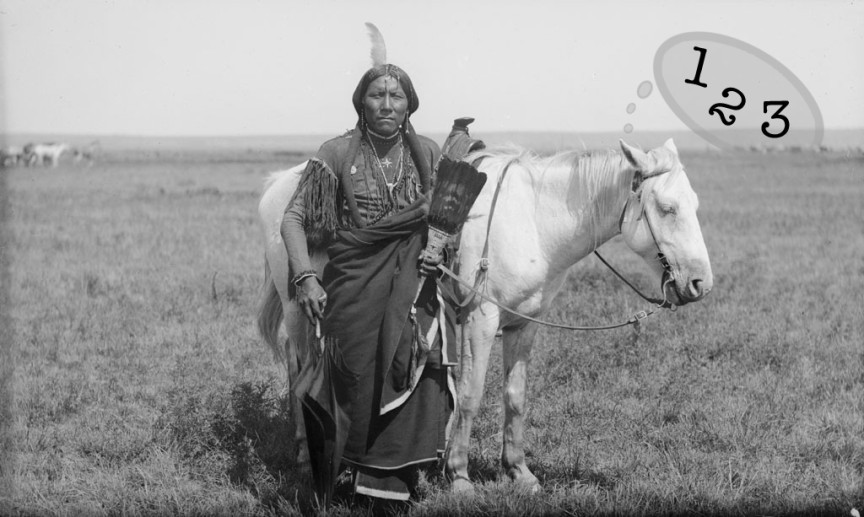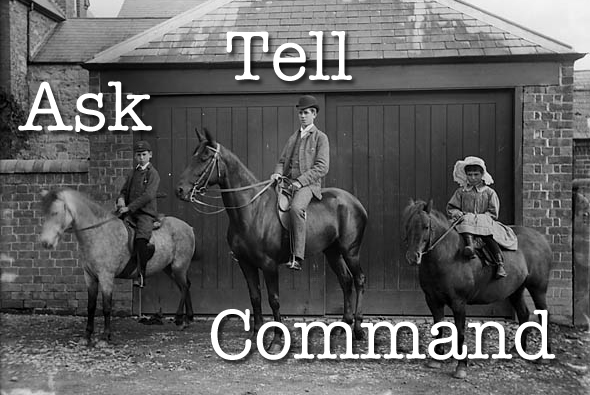Here’s the deal—for a horse to listen to you, you must mean what you “say.” If you don’t mean what you say, they won’t listen.
So, how do you mean what you say?
 The Rule of Three
The Rule of Three
You have three chances to say what you mean. After those three chances…you have to change tack and try something different ’cause you didn’t get your point across. But to make this Rule of Three work, there must be an escalation of pressure. What that means is that if you try something once, when you try it again you have to try again with more pressure than you used the first time. For example:
Good: Ask your horse to walk by squeezing with both legs once. If your horse doesn’t hop to, escalate the pressure and try again—but this time kick once. Yay! You’ve now escalated the pressure.
Bad: You kick your horse to ask for a walk. Nothing happens, so you kick again. When it still doesn’t work, you look at someone and say, “It’s not working.” Then in a final desperate attempt you kick again…only to get exactly the same reaction as the first time.
Here’s the trick: You only have three chances. So you can only escalate twice. The way I think about it is:
Ask, Tell, Command
First thing you want to do is ask your horse to do something. Let’s use the example of asking your horse to follow you on a lead rope: Ask your horse to follow by using the least amount of pressure—start walking forward. If your horse doesn’t follow, escalate and Tell your horse to follow by using your voice to assist the horse in understanding what you want. If your horse still doesn’t follow, escalate again and Command your horse to follow by pulling on the lead rope.
Ask escalate Tell escalate Command
Good: Ask your horse to stop by sitting down deep and pushing down into your stirrups. If your horse doesn’t slam on the brakes, Tell your horse to stop by pulling on the reins and sitting down deep and pushing down into your stirrups. If your horse continues plowing forward, pull on the reins again but harder and longer—plus using your weight in the stirrups—until what you want becomes fact. Capiche?
‘Nother Example: Ask your horse to back up by saying, “Back.” If your horse stands still and stares at you like you’re crazy for talkin’ wacky words to him, escalate that pressure and Tell him to back up by walking toward him while saying, “Back!” Then, if your horse continues to snub you, escalate again by putting your hand on his nose and pushing his head down into his chest and moving him back while saying, “Back, buddy!”
And One Mo’: Ask your horse to open his mouth to take the bit. If he says no and keeps his mouth closed, Tell him to open his mouth by putting your finger into the bar of his mouth and tickling his tongue. Still no dice? Command by putting your finger into his mouth and prying it open with your thumb so that his mouth opens far enough for you to get the bit past his teeth. Blam. Escalated and done.
Use this with everything you do with your horse. Asking to walk? Rule of Three. Asking to trot? Rule of Three. Asking to drive? Rule of Three. Asking to stand still? Rule of Three. Asking to…you get what I’m saying? The Rule of Three is something to live by. Learn it. Live it. Love it.
One last thing: You’ll notice that if you use The Rule of Three effectively you’ll find that you won’t have to use all three levels of The Rule of Three as often. Horses will learn that they have three chances to get to what you want of them before they are Commanded to do it. In order to avoid the Command, they will start listening to the Ask and thus will become lighter and will listen better. If you use The Rule you will end up using less pressure in the long run—which is good for both you and the horse.
And one last final thing: The Rule of Three only works when you go only as far as necessary. This may be common sense, so forgive me, but only escalate as far as necessary. Do not escalate further if your horse does what you ask. Stop there. And praise them.


